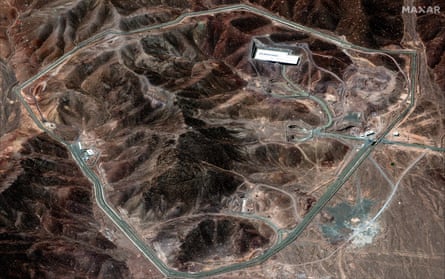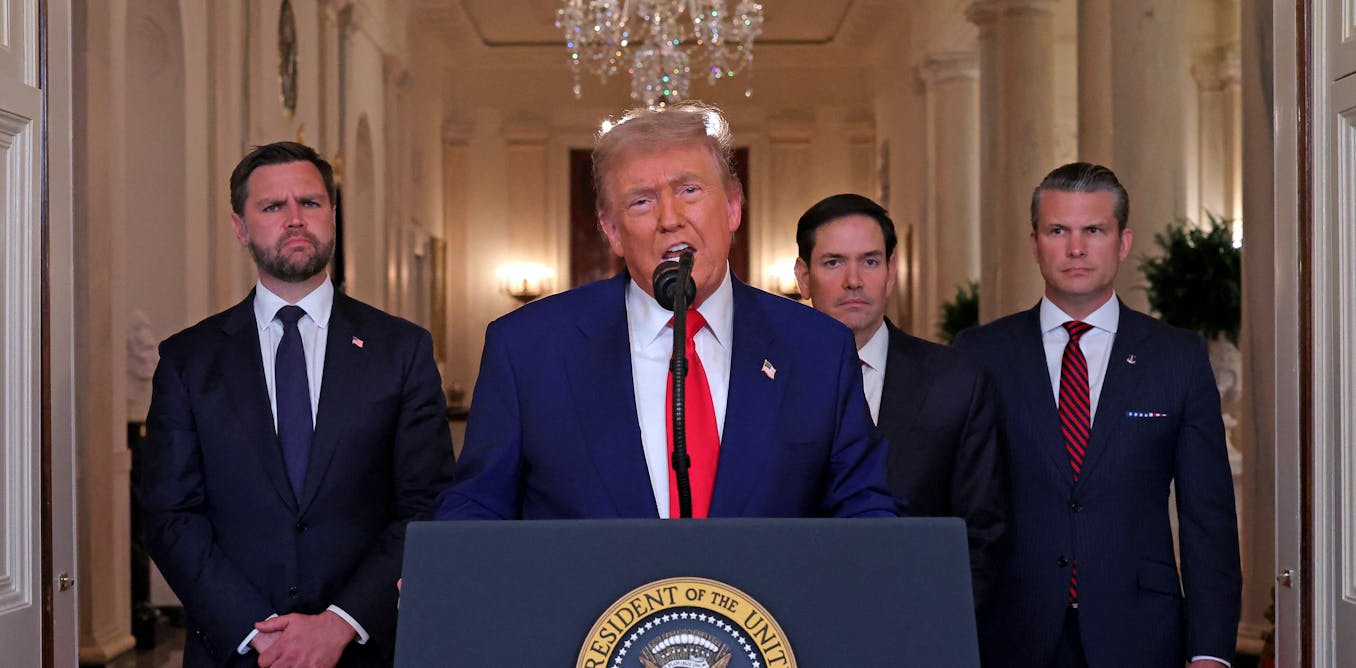Bombing will not make Iran go away. US bombs will not destroy the knowhow needed to build a nuclear weapon or the will do so, if that is what Tehran wants. The huge attack ordered by Donald Trump will not halt ongoing open warfare between Israel and Iran. It will not bring lasting peace to the Middle East, end the slaughter in Gaza, deliver justice to the Palestinians, or end more than half a century of bitter enmity between Tehran and Washington.
More likely, Trump’s rash, reckless gamble will inflame and exacerbate all these problems. Depending on how Iran and its allies and supporters react, the region could plunge into an uncontrolled conflagration. US bases in the Persian Gulf and elsewhere in the region, home to about 40,000 American troops, must now be considered potential targets for retaliation – and possibly British and allied forces, too.
Trump says he has not declared war on Iran. He claims the attack is not an opening salvo in a campaign aimed at triggering regime change in Tehran. But that’s not how Iran’s politicians and people will see it. Trump’s premature bragging about “spectacular” success, and threats of more and bigger bombs, sound like the words of a ruthless conqueror intent on total, crushing victory.
Trump, the isolationist president who vowed to avoid foreign wars, has walked slap bang into a trap prepared by Israel’s Benjamin Netanyahu – a trap his smarter predecessors avoided. Netanyahu has constantly exaggerated the immediacy of the Iranian nuclear threat. His alarmist speeches on this subject go back 30 years. Always, he claimed to know what UN nuclear inspectors, US and European intelligence agencies and even some of his own spy chiefs did not – namely, that Iran was on the verge of deploying a ready-to-use nuclear weapon aimed at Israel’s heart.
This contention has never been proven. Iran has always denied seeking a nuclear bomb. Its supreme leader, Ayatollah Ali Khamenei, issued a fatwa banning any such programme. Netanyahu’s most recent claim that Iran was weaponising, made as he tried to justify last week’s unilateral, illegal Israeli attacks, was not supported by the International Atomic Energy Agency (IAEA) or US intelligence experts. But weak-minded Trump chose to believe it. Reading from Netanyahu’s script, he said on Saturday night that eliminating this incontrovertible nuclear threat was vital – and the sole aim of the US air assault.
So, once again, the US has gone to war in the Middle East on the back of a lie, on disputed, probably faulty intelligence purposefully distorted for political reasons. Once again, as in Iraq in 2003, the overall objectives of the war are unclear, uncertain and open to interpretation by friend and foe alike. Once again, there appears to be no “exit strategy”, no guardrails against escalation and no plan for what happens next. Demanding that Iran capitulate or face “national tragedy” is not a policy. It’s a deadly dead-end.
Iran will not go away, whatever Trump and Netanyahu may imagine in their fevered dreams. It will remain a force in the region. It will remain a country to be reckoned with, a country of 90 million people, and one with powerful allies in China, Russia and the global south. It is already insisting it will continue with its civil nuclear programme.
These events are a reminder of how profound is official US ignorance of Iran. Unlike the UK, Washington has had no diplomatic presence there since the revolution. It has had few direct political contacts, and its swingeing economic sanctions have created even greater distance, further diminishing mutual understanding. Trump’s decision to renege on the 2015 nuclear accord (negotiated by Barack Obama, Britain, France, Germany, Russia, China and the EU) was a product of this ignorance. Ten years later, he is trying to do with bombs what was largely, peacefully achieved through diplomacy by his wiser, less impulsive, less easily led predecessors.

Peace seems more elusive than ever – and Netanyahu is celebrating. The US cannot walk away now. It’s committed. And, as Netanyahu sees it, he and Israel cannot lose. Except, except … Iran cannot somehow be imagined away. It still has to be dealt with. And the reckoning that now looms, short- and long-term, may be more terrible than any of Netanyahu’s scare stories.
Iran previously warned that if the US attacked, it would hit back at US bases. There are many to choose from, in Bahrain, Iraq, Jordan and elsewhere. The Houthis in Yemen say they will resume attacks on shipping in the Red Sea. The strait of Hormuz, so important a transit point for global energy supplies, may be mined, as happened in the 1980s during the Iran-Iraq war. The result could be a global oil shock and markets meltdown. And Iran is still reportedly firing missiles into Israel, despite claims in Jerusalem that most of its ballistic missiles bases have been destroyed.
Reacting to Trump’s attack, Iranian officials say no options are off the table in terms of retaliation. And they say they will not negotiate under fire, despite a call to do so from the British prime minister, Keir Starmer. Rejecting Trump’s unverified claims about the total destruction of all nuclear facilities, they also insist Iran will reconstitute and continue its nuclear programme. The big question now is whether that programme really will be weaponised.
Two radical longer-term consequences may flow from this watershed moment. One is that Khamenei’s unpopular regime, notorious for corruption, military incompetence and economic mismanagement, and deprived of support from Lebanese Hezbollah and Hamas in Gaza, may crack under the strain of this disaster. So far there has been little sign of an uprising or a change in government. That’s not surprising, given that Tehran and other cities are under bombardment. But regime collapse cannot be ruled out.
The other is that, rather than surrender the cherished right to uranium enrichment and submit to the Trump-Netanyahu ultimatum, Iran’s rulers, whoever they are, will decide to follow North Korea and try to acquire a bomb as quickly as possible, to fend off future humiliations. That could entail withdrawal from the nuclear non-proliferation treaty and rejection of the UN inspections regime. After years of trying to play by western rules, Iran could really finally go rogue.
The supposed need to acquire nukes for self-defence is a grim lesson other countries around the world may draw from these events. The proliferation of nuclear weapons is the biggest immediate danger to the future of the planet. What Trump just did in recklessly and violently trying to eliminate an unproven threat may ensure the proven danger of a nuclear-armed world grows ever-more real.
-
Simon Tisdall is a Guardian foreign affairs commentator

 German (DE)
German (DE)  English (US)
English (US)  Spanish (ES)
Spanish (ES)  French (FR)
French (FR)  Hindi (IN)
Hindi (IN)  Italian (IT)
Italian (IT)  Russian (RU)
Russian (RU)  7 hours ago
7 hours ago
























Comments